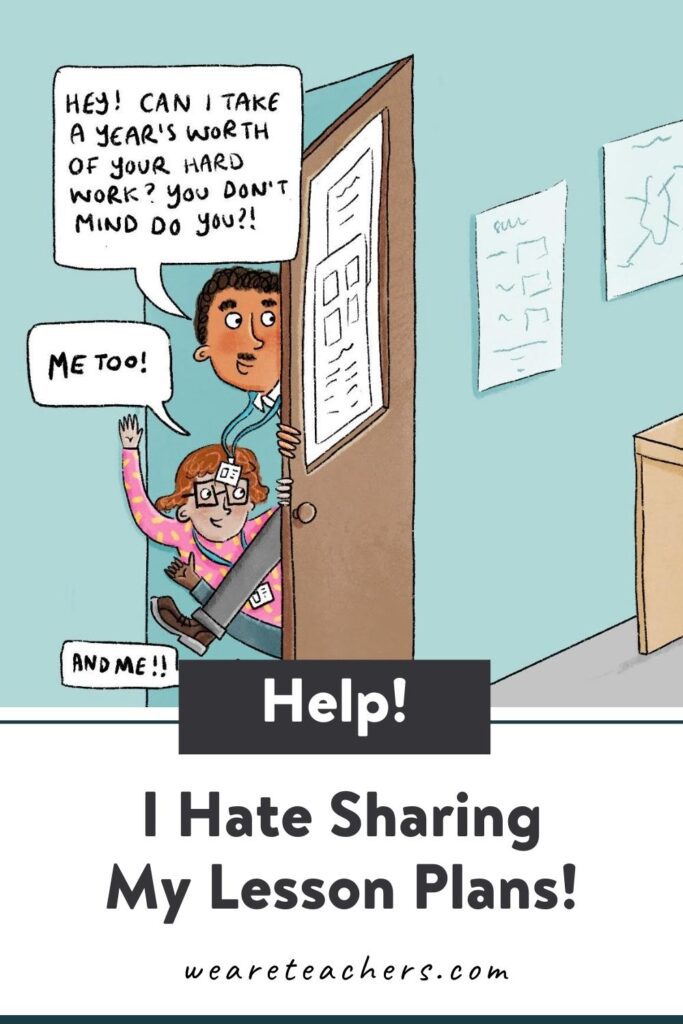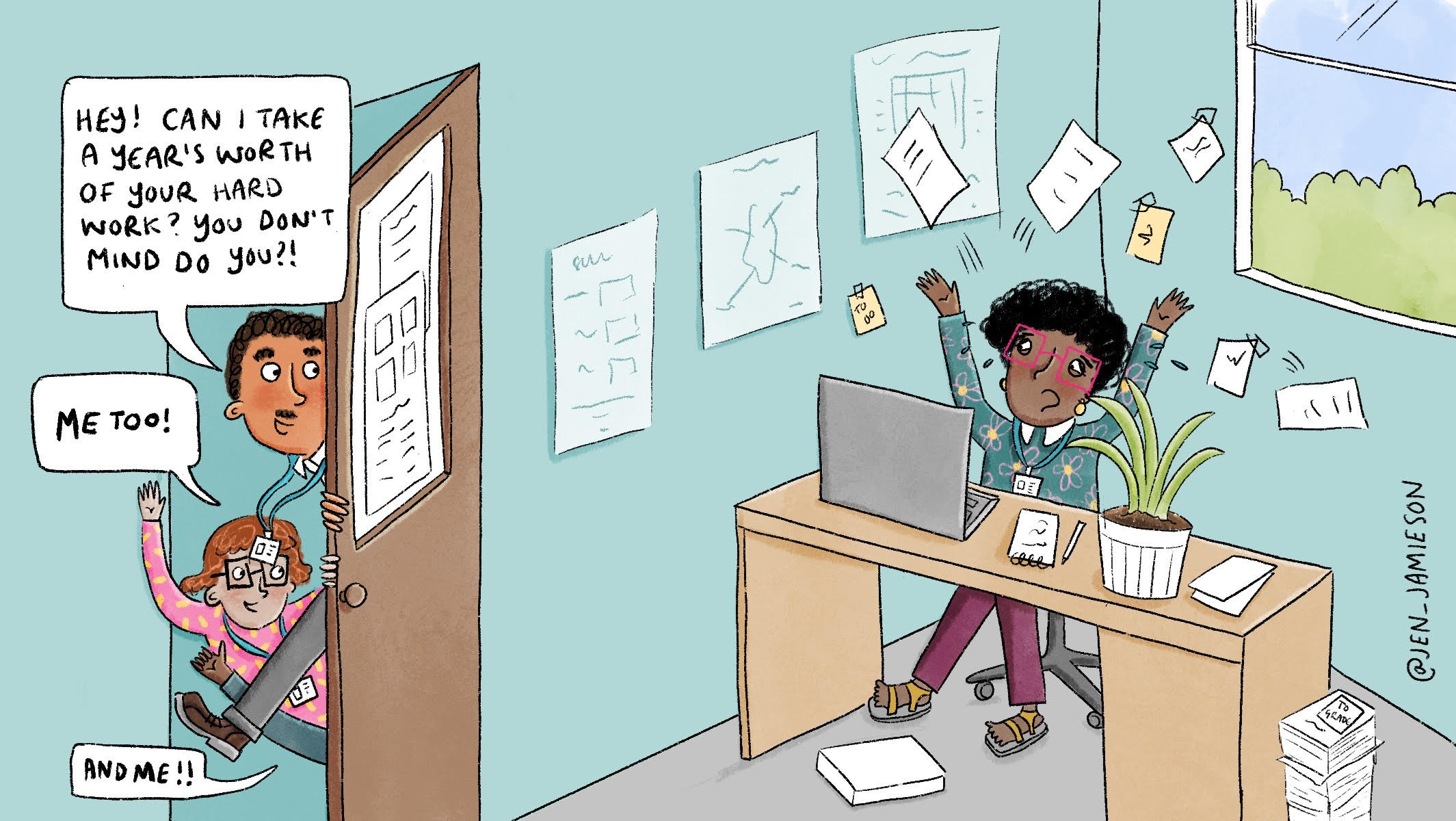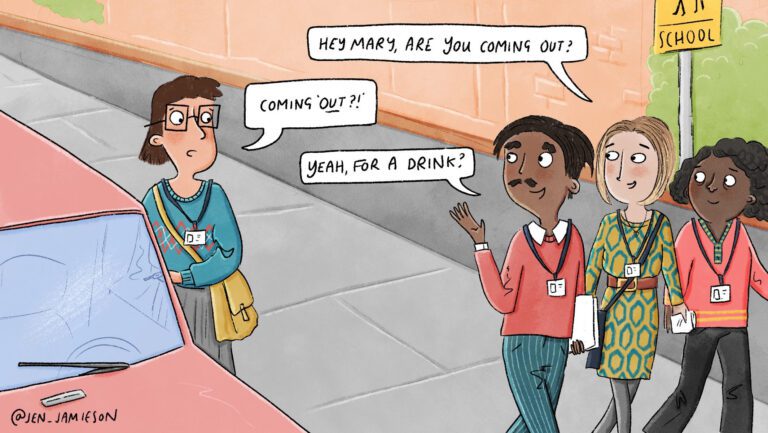Dear WeAreTeachers:
I know it’s unpopular. I know it’s controversial. But I can’t help it! I hate sharing the resources I’ve created. I worked so hard for so many years to develop really amazing lessons with accompanying Google Docs, intricate breakout rooms, interactive Smartboard games, and other time-intensive learning resources. Last year I shared everything I had with my department and it was miserable. On top of my normal workload, I was constantly having to meet or email with teachers to clarify parts of the lesson or explain how a technology platform worked, fix broken links, or troubleshoot for them. This year we’ll have two new teachers on our team and I’m ready to cry at the thought of how much time I’ll lose in order to make their jobs a breeze. Is it terrible if I just claim to have lost all my lesson plans in a freak thumb-drive accident? —Little Miss Hoarder
Dear L.M.H.,
Can I suggest a reframe? It doesn’t sound like you hate sharing your work as much as you hate not being compensated for your work. Compensation doesn’t always mean money (though how amazing would it be if we got raises or bonuses for being good at our jobs?). In this case, I think the compensation you’re looking for is time.
Meet with whoever you need to—direct supervisor, principal, etc.—and explain to them this very issue. Come to the meeting with data or testimonials from other teachers supporting that your resources are effective and powerful. Tell your admin something like, “I’ve worked really hard on developing lessons that boost learning and engage our students. I’m happy to share these plans with my team and guide teachers in implementing them. However, last year I learned I don’t have the time or bandwidth to do this on my current schedule. I know it involves some work with the master schedule, but I’d love to talk about creating an additional planning period for me to develop my team’s skills by mentoring, observing, planning, and working with them on using my resources.”
They might try to hedge and see if you can “be a team player” without having to adjust their schedule, but hold firm. “As I mentioned, while the workload I took on last year benefited my team, I did so at the risk of burning myself out from overcommitment. I’m happy to take on this leadership when the support I need is in place.”
Another form of compensation? Support from the teachers on your team. Go into this year with specific ways that your team can help you help them, even if they’re new. Can someone make the copies you need on the Friday afternoon before the next workweek? Can someone else lead PLC once a month where they “show and tell” new teacher strategies? Identify areas where your new teachers can step in and feel helpful.
Which leads me to my last point: It’s a good exercise to put yourself in the shoes of a new teacher and remember what an absolute TREASURE CHEST they’ve found in you. Personally, I would have sold my teacher soul to have an experienced, amazing teacher share their entire year with me. You’re not only helping to develop teachers, but you’re positively impacting the learning of kids far beyond the ones in your classroom.
But this doesn’t mean you should do so at the cost of your own burnout. We’re not about the martyr narrative.
Dear WeAreTeachers:
I try to be a team player, but I cannot attend teacher-specific PD without flying into a silent rage. We’re either ‘taught’ to do something nearly all of us have been doing for years, infantilized with little games or prizes, or we sit through a presentation vague enough to apply to a wide range of content areas (and therefore helpful to no one). These PD sessions make me feel ridiculous instead of sharpening or even validating my professional skills. Should I complain to my principal, or will that make me look like I’m just being uncooperative? —Kind of Uncooperative
Dear K.O.U.,
Are you saying you don’t want to win a “Teachers Are Leaders” pencil after doing a scavenger hunt around the room for office supplies? How ungrateful! (I kid.)
The PD you describe is a symptom of two things we see a lot in education. One is classroom teachers being moved into leadership roles despite not actually being ready for those leadership roles. This is how we get professional development that does no developing of the profession. The second is that sometimes schools and districts try to paint PD with far too wide a brush (“20% of our staff could use a refresh on this topic, but it would look bad if we pick and choose who needs it, so let’s make 100% sit in”).
When it comes to chatting with your principal, there’s a big difference between complaining and proactively offering a solution to something that doesn’t serve you. First, look up professional development opportunities that you think would meet your specific needs and goals. Most districts have personnel that can recommend particularly good organizations/trainers.
Then, meet with your admin and say something like, “I’m worried that the PD I’m attending isn’t sharpening my professional skills. I’ve spent some time looking up PD that I’m really excited about and would have a huge impact on my teaching. These would meet the goals I’ve set for my students and my own learning this year. Could I swap these with the training on ___ since I’ve already mastered that topic?” While they may not be able to make a swap (sometimes their higher-ups mandate PD), I can’t imagine an administrator not admiring your initiative and at least trying to work with you.
(I mean, I can imagine that kind of administrator. I just hope for your sake, they’re not like that.)
Dear WeAreTeachers:
I live in an area where the fear of educational ‘indoctrination’ has taken over. My district now forbids any kind of classroom decorations or signs that would indicate our personal or political beliefs. In the past, I’ve had a Pride flag and BLM sign up so students don’t have to guess how they’ll be treated in my room. What can I do now that these are banned? —Undercover Ally
Dear U.A.,
Unfortunately, we live in a time when affirming students’ right to exist and speaking out against crimes against humanity is “political.” (Never mind that teaching is and always has been a political act guided by politicians at multiple levels, but it’s fine—I digress.) I’ve noticed a movement of teachers on Twitter dedicated to putting these non-neutrality posters up in their classrooms this fall.
The good news is that no one can ban you from showing students what you believe. Students are often way more perceptive than we give them credit for. The kids in your room will understand that you are in the business of creating an inclusive and responsive classroom when they see that you:
- Intervene when you hear derogatory terms/language
- Redirect students to self-correct biased thinking
- Introduce other perspectives in class discussions
- Genuinely enjoy their presence and value their contributions to your class
You can also put language in your syllabus or first-day class rules to the effect of “This is a classroom where I respect each one of you. I expect that you will treat each other with respect, whether in word or action, and will intervene anytime I see or hear that expectation violated.” The language is stark and clinical but clear enough to establish that you’re not a person who turns a blind eye to mistreatment.
Also, if you feel like getting in some “good trouble,” email board members and ask if you’re allowed to have a picture of your spouse on your desk or wear a small cross necklace since those might indicate your personal beliefs. Something tells me they’ll have no problem with those.
(Then email me their responses so I have an article to write.)
Do you have a burning question? Email us at askweareteachers@weareteachers.com.
Dear WeAreTeachers:
Confession time: I have a major crush on our school’s band director. Let’s call him Mr. Davis. From the time we met at back-to-school orientation two years ago (he traded me his blueberry yogurt after he heard me say it’s my favorite), I’ve had my eye on him. The problem is I’m way too shy to make a move. Plus, I teach English, so there’s not a whole lot of overlap in our courses or planning. How do I approach him without making him feel uncomfortable, doing something unprofessional, or revealing that I’ve had a teen rom-com-esque crush on him for two years? —Pining and Whining


